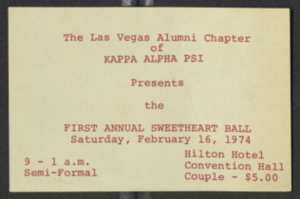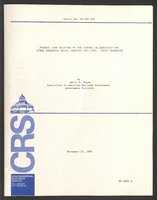Search the Special Collections and Archives Portal
Search Results

Transcript of interview with Stavros Anthony by Claytee White and Stefani Evans, July 24, 2017
Date
Archival Collection
Description
Born of humble beginnings to a sheep farming family in Cyprus, Greece, Stavros Anthony embodies the legacy of the American spirit and ability to reach as far as one can to achieve personal greatness. His family came to the United States in 1955 and moved to Kansas City, Missouri, where his father started working in the restaurant business as a cook until 1967. Moving to Detroit proved to be a benefit for the family, as his father became the executive chef for the Grosse Point Yacht Club, one of the most exclusive clubs in the country. He went from sheep herding, to peeling potatoes, to the executive and afforded his family a typical middle class lifestyle. He graduated from high school in 1975 and attended Wayne State University, earning is B.A. in criminal justice and starting his career in policing with the university’s police department. Upon graduating in 1980, he faced a frozen job industry in Detroit due to a very bad auto recession. He applied for and secured a position as a po
Text

Transcript of interview with Raymonde Fiol by Barbara Tabach, August 12, 2015
Date
Archival Collection
Description
In this interview, Fiol discusses her experience as a a hidden child in the Holocaust and her family's history. She also talks about her involvement with the Las Vegas Holocaust survivors group.
Raymonde "Ray" Fiol is president of the Holocaust Survivors Group of Southern Nevada. A Jewish Holocaust survivor whose parents were killed in Auschwitz, Fiol was hidden by a Christian family of Resistance fighters during her childhood in Nazi-occupied Paris, France. She married American serviceman Phil Fiol and left Paris in 1957. The couple lived in New York City where she worked in inventory control. She retired to Las Vegas, Nevada around 2003 and became active in the local Holocaust Survivors Group. In 2007, she became president of the organization, which provides essential services to Holocaust survivors and helps them share their stories. Fiol is also a member of the Nevada Governor?s Advisory Council on Education Relating to the Holocaust and the coordinating council of Shoah International. Her dedication to preserving the memory of the Holocaust and caring for survivors earned her the Nevada Senior Citizen of the Year award from the Nevada Delegation of the National Silver Haired Congress and the Aging Services Directors Organization in 2014, and in 2013 she was named Mensch Volunteer of the Year by the Jewish Federation of Las Vegas. In this interview, Ray reflects upon her traumatic childhood experiences, and shares how she learned details of her family?s history from a woman in France who had researched the destiny of the local Jewish community. She also discusses her involvement with the survivors group, and the positive impacts of its outreach activities, as well as goals to ensure future generations learn about, and from, the Holocaust.
Text

Transcript of interview with Evelyn Miller McDonald by Maylene C. Cabatingan, February 26 & 27, 1980
Date
Archival Collection
Description
On February 26, and 27, 1980, Maylene C. Cabatingan interviewed Evelyn Miller McDonald (born 1905 in Alderson, West Virginia) about her life in Las Vegas, Nevada. Also present during the interview is Maylene’s step-father (name unknown) who occasionally participates in the conversation. At the time of the interview, McDonald had lived in Nevada for over seventy-two years and described early Las Vegas as a small-town railroad community with few amenities. McDonald discusses her occupational history, and how her father started the first car garage in Las Vegas. She goes on to talk about the impact of the Great Depression on Las Vegas and how Hoover Dam’s construction reduced the severity of the financial depression in comparison to other cities. She then recites the hotels that were built and the appeal that Vegas had to tourists and divorcees. McDonald later discusses how prostitution was accepted by the community, and recalls a story about how local businessmen rallied together to ensure that a minister would preach the funeral for a young woman who had died, despite being a prostitute. McDonald concludes her interview with a brief discussion of her goals in life and her pride in her daughters.
Text

Interview with Lafayette "Lafe" H. Dana, June 20, 2005
Date
Archival Collection
Description
Text

Interview with Jerry Don Claborn, July 30, 2004
Date
Archival Collection
Description
Text

John McKay interview, March 3, 1980: transcript
Date
Archival Collection
Description
On March 3, 1980, Donna Malloy interviewed John McKay (b. July 7th, 1926 in North Dakota) about his life in Las Vegas, Nevada. McKay begins by speaking about his family history, his career in the electronics and engineering field for aerospace, as well as his experiences in two wars. Moreover, McKay speaks about his hobbies of hunting and fishing and his time as a musician around Las Vegas. McKay also spends time going over how the city of Las Vegas has grown and changed, the increase in crime, and the extreme floods in the 1950s. Lastly, McKay talks about the Nuclear Test Site, how casino gaming chips were used as money around the city, how the city of Las Vegas started and the future of the valley.
Text

Transcript of interview with Ellen DeLand by Dennis McBride, January 19-20, 1996
Date
Archival Collection
Description
Ellen DeLand was born on April 1, 1931 and went to Santa Monica High School. She was very active in the Las Vegas LGBT community. She was interviewed January 19, 1996.
Text

Mabel Hoggard: community interest materials (folder 1 of 3)
Date
Archival Collection
Description
Folder of materials from the Mabel Hoggard Papers (MS-00565) -- Personal papers file. This folder contains newspaper clippings, jewelry designs, a "Basic Principles of Parliamentary Law and Protocol" booklet by Marguerite Grumme (not digitized in its entirety), event programs (including Las Vegas school graduations and reunions), "Nevada Nuclear Waste Storage Investigations" booklet (November 1980), "Black Women: The Unsung Heroines, Black History Week 1979" booklet, and other miscellaneous booklets (not all are digitized in their entirety).
Mixed Content

Drug laws: reports, analysis, House Resolution 5484, status, correspondence, clippings, press release, statement from Senator Hecht, and notes
Date
Archival Collection
Description
Folder of documents from the Senator Chic Hecht Political Papers (MS-00003) -- Subject Files -- Judiciary file.
Text
